
Shownotes
Wisdom-Trek / Creating a Legacy
Welcome to Day 958 of our Wisdom-Trek, and thank you for joining me.
This is Guthrie Chamberlain, Your Guide to Wisdom
The Enneagram System – Type Number Two – The Helper – Ask Gramps
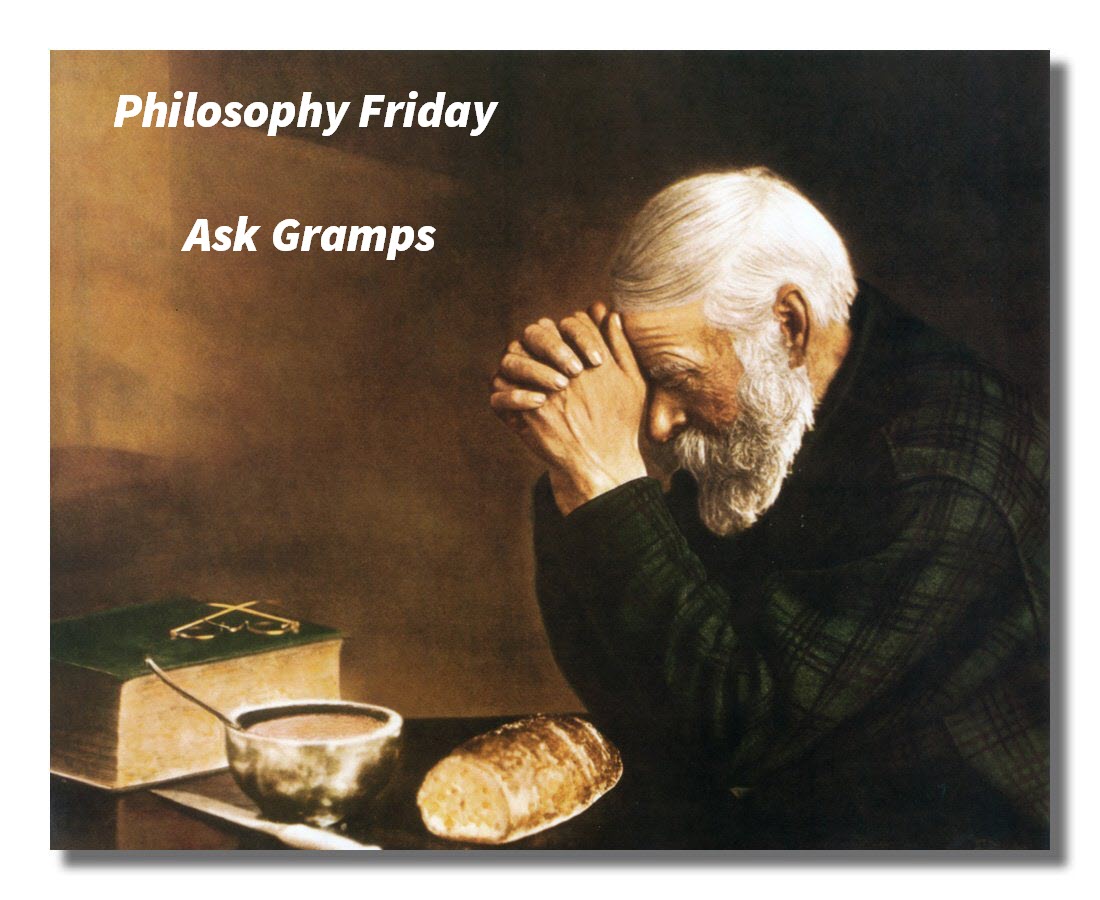
Thank you for joining us for our five days per week, wisdom and legacy building podcast. We are broadcasting from our studio at The Big House in Marietta, Ohio. This is Day 958 of our trek and time for our Philosophy Friday series. Each Friday we ponder some of the basic truths and mysteries of life and how they can impact us in creating our living legacy.
As we continue on this trek called life, sometimes we have questions about life, so our Friday trek is a time when we can “Ask Gramps.” Gramps will answer questions that you would like to ask your dad or granddad, but for whatever reason, this is not possible. No matter how old we are, I know that all of us would like the opportunity to ask Dad or Gramps questions about life in many areas.
Today is the tenth episode in our series delving into what makes each of us respond differently to life situations and circumstances. Understanding ourselves and how others may interpret life through their paradigm will allow us to interact with each other with more love and compassion. This empathy can be achieved by utilizing a profound tool called “The Enneagram.”
If you have missed any of our past nine Friday series, I would recommend going back and listening to them or read the Wisdom Journals. As a review, the tool that we refer to as the Enneagram (Any-a-Gram) is a circle with nine interconnected points (Ennea refers to 9, and Gram refers to a drawing). Check out today’s or a prior week’s Wisdom Journal for a representation of it. I have also included a copy of “The Enneagram At-A-Glance,” which was compiled by Suzanne H. Eller in today’s Wisdom Journal. If you would like a PDF copy, click on the link in today’s Wisdom Journal on our website Wisdom-Trek.com.
I would also recommend the book The Road Back to You written by Ian Morgan Cron and Suzanne Stabile. It is an excellent book about an enneagram journey to self-discovery from a Christian perspective.
In the first seven episodes, we explored how The Enneagram System works and then presented an overview of all nine personality types. The past two weeks we took a deep dive into type number One and Two, which is referred to as “The Reformer” or “The Perfectionist,” and type number two “The Helper.” This week we will explore type Number three “The Achiever.” Next week we will focus on type number four “The Individualist.”
Since we are exploring the Enneagram in detail, and I would also recommend reading the Wisdom Journal for each Friday to see the diagrams presented each week. As helpful as the Enneagram is, keep in mind, it is still only a tool, and cannot replace or usurp the precepts that are found in God’s Word. All decisions and actions that we make in life must be in harmony with God’s precepts.
So the questions for the next several months will be:
“Hey, Gramps, why do people act and react to situations and circumstances in life differently? How can I gain wisdom to better understand myself and others so that I can love, serve, and minister to them on a deeper level?”
The Enneagram System – Type Number Two – The Helper
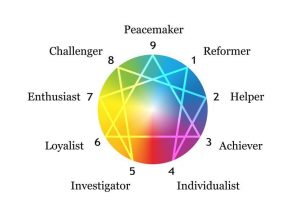
3 – THE HELPER
Enneagram Type Two
-
The Caring, Interpersonal Type:
Generous, Demonstrative, People-Pleasing, and Possessive· Type Two in Brief
Twos are empathetic, sincere, and warm-hearted. They are friendly, generous, and self-sacrificing, but can also be sentimental, flattering, and people-pleasing. They are well-meaning and driven to be close to others, but can slip into doing things for others in order to be needed. They typically have problems with possessiveness and with acknowledging their own needs. At their Best: unselfish and altruistic, they have unconditional love for others.
Basic Fear: Of being unwanted, unworthy of being loved
Basic Desire: To feel loved
Enneagram Two with a One-Wing: “Servant”
Enneagram Two with a Three-Wing: “The Host/Hostess”
Key Motivations: Want to be loved, to express their feelings for others, to be needed and appreciated, to get others to respond to them, to vindicate their claims about themselves.
The Meaning of the Arrows (in brief)
When moving in their Direction of Disintegration (stress), needy Twos suddenly become aggressive and dominating like an unhealthy Eight. However, when moving in their Direction of Integration (growth), prideful, self-deceptive Twos become more self-nurturing and emotionally aware, like healthy Fours.
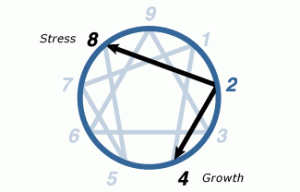
· Type Two Overview
We have named personality type Two “The Helper” because people of this type are either the most genuinely helpful to other people or, when they are less healthy they are the most highly invested in seeing themselves as helpful. Being generous and going out of their way for others makes Twos feel that theirs is the richest, most meaningful way to live. The love and concern they feel—and the genuine good they do—warms their hearts and makes them feel worthwhile. Twos are most interested in what they feel to be the “really, really good” things in life—love, closeness, sharing, family, and friendship.
Louise is a minister who shares the joy she finds in being a Two.
“I cannot imagine being another type, and I would not want to be another type. I like being involved in peoples’ lives. I like feeling compassionate, caring, and nurturing. I like cooking and homemaking. I like having the confidence that anyone can tell me anything about themselves and I will be able to love them….I am really proud of myself and love myself for being able to be with people where they are. I really can, and do, love people, pets, and things. And I am a great cook!”
When Twos are healthy, and in balance, they really are loving, helpful, generous, and considerate. People are drawn to them like bees to honey. Healthy Twos warm others in the glow of their hearts. They enliven others with their appreciation and attention, helping people to see positive qualities in themselves that they had not previously recognized. In short, healthy Twos are the embodiment of “the good parent” that everyone wishes they had: someone who sees them as they are, understands them with immense compassion, helps and encourages with infinite patience, and is always willing to lend a hand—while knowing precisely how and when to let go. Healthy Twos open our hearts because theirs are already so open and they show us the way to be more deeply and richly human.
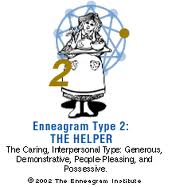
Louise continues:
“All of my jobs revolved around helping people. I was a teacher who wanted to be sensitive to children and help them get off to a good start. I was a religious education director in a number of parishes. I thought that if people learned about the spiritual life, they’d be happier…The most important part of my life is my spiritual life. I was in a religious community for ten years. I married a former priest, and we both have our spirituality as the basis of our life together.”
However, Twos’ inner development may be limited by their “shadow side”—pride, self-deception, the tendency to become over-involved in the lives of others, and the tendency to manipulate others to get their own emotional needs met. Transformational work entails going into dark places in ourselves, and this very much goes against the grain of the Two’s personality structure, which prefers to see itself in only the most positive, glowing terms.
Perhaps the biggest obstacle facing Twos, Threes, and Fours in their inner work is having to face their underlying Center, the fear of worthlessness. Beneath the surface, all three types fear that they are without value in themselves, and so they must be or do something extraordinary in order to win love and acceptance from others. In the average to unhealthy Levels, Twos present a false image of being completely generous and unselfish and of not wanting any kind of pay-off for themselves, when in fact, they can have enormous expectations and unacknowledged emotional needs.
Average to unhealthy Twos seek validation of their worth by obeying their superego’s demands to sacrifice themselves for others. They believe they must always put others first and be loving and unselfish if they want to get love. The problem is that “putting others first” makes Twos secretly angry and resentful, feelings they work hard to repress or deny. Nevertheless, they eventually erupt in various ways, disrupting Twos’ relationships and revealing the inauthenticity of many of the average to unhealthy Two’s claims about themselves and the depth of their “love.”
But in the healthy range, the picture is completely different. As an example, Don Riso, who much of this work comes from puts it this way: “My own maternal grandmother was an archetypal Two. During World War II, she was “Moms” to what seemed like half of Keesler Air Force Base in Biloxi, Mississippi, feeding the boys, allowing her home to be used as a “home away from home,” giving advice and consolation to anyone lonely or fearful about going to war. Although she and her husband were not wealthy and had two teenage children of their own, she cooked extra meals for the servicemen, put them up at night, and saw to it that their uniforms had all of their buttons and were well pressed. She lived until her 80’s, remembering those years as the happiest and most fulfilling of her life—probably because her healthy Two capacities were so fully and richly engaged.”
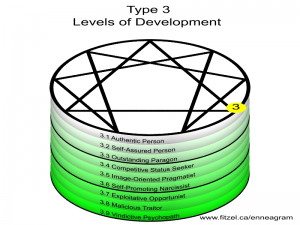
· Type Two—Levels of Development
Healthy Levels
Level 1 (At Their Best): Become deeply unselfish, humble, and altruistic: giving unconditional love to self and others. Feel it is a privilege to be in the lives of others.
Level 2: Empathetic, compassionate, feeling for others. Caring and concerned about their needs. Thoughtful, warm-hearted, forgiving and sincere.
Level 3: Encouraging and appreciative, able to see the good in others. Service is important, but takes care of self too: they are nurturing, generous, and giving—a truly loving person.
Average Levels
Level 4: Want to be closer to others, so start “people pleasing,” becoming overly friendly, emotionally demonstrative, and full of “good intentions” about everything. Give seductive attention: approval, “strokes,” flattery. Love is their supreme value, and they talk about it constantly.
Level 5: Become overly intimate and intrusive: they need to be needed, so they hover, meddle, and control in the name of love. Want others to depend on them: give, but expect a return: send double messages. Enveloping and possessive: the codependent, self-sacrificial person who cannot do enough for others—wearing themselves out for everyone, creating needs for themselves to fulfill.
Level 6: Increasingly self-important and self-satisfied, feel they are indispensable, although they overrate their efforts in others’ behalf. Hypochondria, becoming a “martyr” for others. Overbearing, patronizing, presumptuous.
Unhealthy Levels
Level 7: Can be manipulative and self-serving, instilling guilt by telling others how much they owe them and make them suffer. Abuse food and medication to “stuff feelings” and get sympathy. Undermine people, making belittling, disparaging remarks. Extremely self-deceptive about their motives and how aggressive and/or selfish their behavior is.
Level 8: Domineering and coercive: feel entitled to get anything they want from others: the repayment of old debts, money, sexual favors.
Level 9: Able to excuse and rationalize what they do since they feel abused and victimized by others and are bitterly resentful and angry. Somatization of their aggressions results in chronic health problems as they vindicate themselves by “falling apart” and burdening others. Generally corresponds to the Histrionic Personality Disorder and Factitious Disorder.
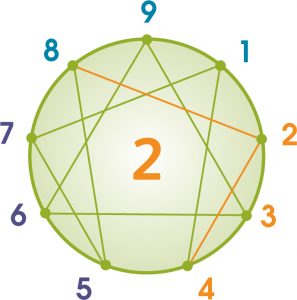
Personal Growth Recommendations for Enneagram Type Twos
- First and foremost, remember that if you are not addressing your own needs, it is highly unlikely that you will be able to meet anyone else’s needs without problems, underlying resentments, and continual frustration. Further, you will be less able to respond to people in a balanced way if you have not gotten adequate rest, and taken care of yourself properly. It is not selfish to make sure that you are okay before attending to others’ needs—it is simply common sense.
- Try to become more conscious of your own motives when you decide to help someone. While doing good things for people is certainly an admirable trait, when you do so because you expect the other person to appreciate you or do something nice for you in return, you are setting yourself up for disappointments. Your type has a real danger of falling into unconscious codependent patterns with loved ones, and they almost never bring you what you really want.
- While there are many things you might want to do for people, it is often better to ask them what they really need first. You are gifted at accurately intuiting others’ feelings and needs, but that does not necessarily mean that they want those needs remedied by you in the way you have in mind. Communicate your intentions, and be willing to accept a “no thank you.” Someone deciding that they do not want your particular offer of help does not mean that they dislike you or are rejecting you.
- Resist the temptation to call attention to yourself and your good works. After you have done something for others, do not remind them about it. Let it be: either they will remember your kindness themselves and thank you in their own way or they will not. Your calling attention to what you have done for them only puts people on the spot and makes them feel uneasy. It will not satisfy anyone or improve your relationships.
That will conclude our focus on personality type number Two – The Helper. A word of encouragement for those of you who are Enneagram type number Two from God’s word. Your heart of service must stem from a heart of love, both for yourself, and for others.
Mark 12:30-31 – And you must love the Lord your God with all your heart, all your soul, all your mind, and all your strength.’ The second is equally important: ‘Love your neighbor as yourself.’ No other commandment is greater than these.
Join us again next Friday as we further explore the Enneagram on our “Ask Gramps” episode. We will specifically explore the Enneagram Number Four – The Individualist in depth. The information that we explore will allow you to unlock who you are as we travel on our trek of life and discover more about yourself and others as you impact God’s kingdom. I know you will find these insights interesting, practical, and profitable in living a rich and satisfying life.
Our next trek is Mediation Monday where we will help you reflect on